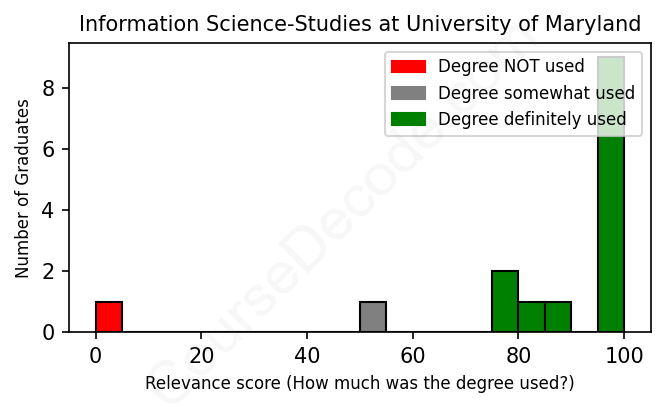
First, some facts. Of the Information Science-Studies graduates from University of Maryland we've analyzed , here's how many have used (or NOT used) their degree in their career:

These are estimates based on AI analysis of 15 LinkedIn profiles (see below).
The verdict? Significantly above average. Overall, with an average relevance score of 84%, Information Science-Studies graduates from University of Maryland have a much higher likelihood (+17%) of finding work in this field compared to the average graduate across all fields:
And for comparison, here's the chart for all profiles we've looked at across all degrees.
Also, after graduating, only 6% of these graduates have pursued further education other than another Bachelor's degree (such as a Masters degree or other), compared to the average across all profiles of 35%. This suggests a Bachelors degree is enough for most Information Science-Studies graduates, and it's normal to look for work straight after graduation.
See the details:
|
Relevance score: 85% We think this person has gone into a career highly relevant to their degree. We think this person has gone into a career highly relevant to their degree.
DEGREE INFOGraduated in 2020 from University of Maryland with a Bachelor of Science - BS in Information Science-Studies. No other secondary education since. JOB HISTORY SINCE GRADUATIONDiversity Recruiter, Air Force ROTC (AFROTC) United States Air Force Jun 2020 - Jul 2021 Student, Undergraduate Cyberwarfare Training  United States Air Force Aug 2021 - Mar 2022 Officer-in-Charge, Client Systems & RF transmissions  United States Air Force Apr 2022 - Sep 2022 Officer-in-Charge, Cyber Operations Center  United States Air Force Oct 2022 - Feb 2024 Officer-in-Charge, Network Operations Center  United States Air Force Mar 2024 - Present ABOUTSeparating Air Force Cyber Officer with 6 years of experience in IT Cyber Operations Management, including vulnerability management, client systems, and trouble ticket oversight. Eager to pivot into a data science role, leveraging strong analytical skills and a strategic mindset. A Collaborative leader and team player with excellent communication skills poised to drive innovation in data science. |
The top 10 most common jobs done by the graduates we've analyzed (ranked most common to least) are:
When looking at the career paths of graduates from the University of Maryland with degrees in Information Science-Studies, it's pretty clear that people have ventured into a mixed bag of roles. A significant number have landed positions that really tap into the skills learned in their coursework, such as Data Analysts, Cybersecurity Engineers, and Technical Program Managers. These roles typically require a strong grasp of data management, analytics, and information technology, all of which are key components of the Information Science curriculum. It’s great to see that many grads are finding jobs where they can flex those skills and make an impact in areas like data analysis and cybersecurity.
However, it's also noticeable that not all positions are directly relevant to the field. Some individuals took on roles like Data Entry Specialist or even worked in areas like finance or retail where the connection to Information Science isn't as strong. In fact, quite a few roles seem to do a bit of a disservice to the degree. While some skills from information science may come in handy, like analytical thinking or organization, many of these jobs don’t fully utilize the specialized training these grads have received. So, while many graduates are finding relevant work, it’s a mixed bag, and there are definitely opportunities for improvement to ensure that the knowledge gained in school is fully leveraged in their careers.
Here is a visual representation of the most common words in job titles for Information Science-Studies graduates (this is across all Information Science-Studies graduates we've analyzed, not just those who went to University of Maryland):

Looking at the career paths of graduates from the University of Maryland with degrees in Information Science-Studies, it seems like a fair number of them are kicking off their lives post-graduation with solid jobs that are relevant to their field. Many of them start out in positions like data entry specialists, systems admins, or even in more technical roles like security engineers and data analysts. For example, a 2018 grad went from a computer technician role to being a data administrator, which shows that they’re building upon their experiences in the tech world. Some took on management roles pretty quickly, like the 2019 grad who became a technical program manager at a military tech center within a year of graduating. Overall, the first jobs tend to align well with the skills learned in their degree program.
Fast forward five to ten years, and it looks like these graduates are continuing to climb the career ladder. Many have progressed to senior roles, such as principal security engineers or information systems managers. There are also examples of individuals pivoting slightly but still staying within the tech realm, such as the student who transitioned from a cybersecurity intern to a technologist and then a full-stack engineer. Even those who took on unique paths, like teaching English in Japan, often end up with experiences that complement their Information Science backgrounds. All in all, this group doesn’t just find jobs; they’re finding relevant careers that build on their educational foundation, indicating that information science is indeed a valuable degree with diverse career opportunities. While some may take winding paths, many graduates seem to end up in fulfilling jobs within their field. That’s definitely something worth considering if you’re thinking about this major!
Honestly, a Bachelor’s degree in Information Science-Studies can be a bit of a mixed bag, but I’d say it’s generally not as hard as some other degrees, like engineering or organic chemistry. You’ll cover topics like data management, information retrieval, and user experience, which can definitely have their challenging moments, especially if you’re not super into tech. But overall, it’s pretty approachable, especially if you stay organized and keep up with your coursework. If you have a knack for navigating technology and enjoy problem-solving, you'll likely find it more enjoyable than overwhelming. Just remember, every student’s experience is different, so it really depends on your interests and study habits!
Most commonly, in the LinkedIn profiles we've looked at, it takes people 4 years to finish a Bachelor degree in Information Science-Studies.
So, looking at these graduates from the University of Maryland, it seems like they've generally done pretty well for themselves after college. Graduates from 2018 and 2019 had some meandering starts, especially with multiple short-term roles, but now they're settling into more stable jobs that likely pay decently. Those who graduated in 2020 definitely started strong, particularly those in tech and cybersecurity, with clear upward trajectories that suggest they’re earning solid salaries now. The most recent grads from 2022 are breaking into promising roles early on, especially in tech-related fields, which usually come with good pay. Overall, while some of the earlier careers might not scream mega bucks right away, it seems they’re on paths that will lead to decent money sooner rather than later.
Here is a visual representation of the most common words seen in the "about" section of LinkedIn profiles who have a Bachelor degree in Information Science-Studies (this is across all Information Science-Studies graduates we've analyzed, not just those who went to University of Maryland). This may or may not be useful:

Here are all colleges offering a Bachelor degree in Information Science-Studies (ordered by the average relevance score of their Information Science-Studies graduates, best to worst) where we have analyzed at least 10 of their graduates:
| College | Score | Count |
|---|---|---|
 University of Maryland University of Maryland
|
84 | 15 |